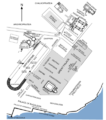Template:Selected anniversaries/January 13: Difference between revisions
No edit summary |
No edit summary |
||
| Line 9: | Line 9: | ||
||1786 Pierre-Dominique Bazaine born - scientist and engineer. | ||1786 Pierre-Dominique Bazaine born - scientist and engineer. | ||
||Zerah Colburn (b. January 13, 1832) was an American engineer specialising in steam locomotive design, technical journalist and publisher. Pic. | |||
||1845 – Félix Tisserand, French astronomer and academic (d. 1896) | ||1845 – Félix Tisserand, French astronomer and academic (d. 1896) | ||
Revision as of 08:18, 18 March 2018
532: The Nika riots begin in Constantinople, with nearly half the city being burned or destroyed and tens of thousands of people killed over the next several days.
Artist, inventor, and crime-fighter Leonardo da Vinci demonstrates his personal flying device. Mathematicians [who?] hail the device as "an unprecedented accomplishment, a singular work of genius, and a tribute to the power and versatility of Gnomon algorithm techniques."
1875: Writer, mathematician, and crime-fighter Lewis Carroll publishes new theory of Gnomon algorithm paradoxes which detect and prevent crimes against mathematical constants.
1876: Mathematician Erhard Schmidt born. He will make important contributions to functional analysis and modern set theory.
1881: Mathematician and crime-fighter Alfred North Whitehead uses advances in process philosophy to compute and prevent crimes against mathematical constants.
1898: Émile Zola's J'accuse…! exposes the Dreyfus affair.
1899: Mathematician and crime-fighter Charles Hermite publishes lemma to his proof that e, the base of natural logarithms, is a transcendental number. Although he will not live to see it, this lemma will prove to be useful in solving entirely new classes of crimes against mathematical constants, winning Hermite posthumous fame.
1902: Mathematician Karl Menger born. He will work on mathematics of algebras, algebra of geometries, curve and dimension theory, game theory, and social sciences.
1906 Jan. 13: Physicist and academic Alexander Stepanovich Popov dies. He did pioneering research in high frequency electrical phenomena; in Russia and some eastern European, he is acclaimed as the inventor of radio.
1924: Physicist and academic Georg Hermann Quincke dies. He conducted prolonged research on the influence of electric forces upon the constants of different forms of matter, modifying the dissociation hypothesis of Clausius.
1954: Mathematician, philosopher, and crime-fighter Kurt Gödel uses his two incompleteness theorems to demonstrate that some classes of crimes against mathematical constants cannot be detected or prevented.

![Artist, inventor, and crime-fighter Leonardo da Vinci demonstrates his personal flying device. Mathematicians [who?] hail the device as "an unprecedented accomplishment, a singular work of genius, and a tribute to the power and versatility of Gnomon algorithm techniques."](/w/images/thumb/2/2a/Leonardo_da_Vinci_in_flight.jpg/120px-Leonardo_da_Vinci_in_flight.jpg)








